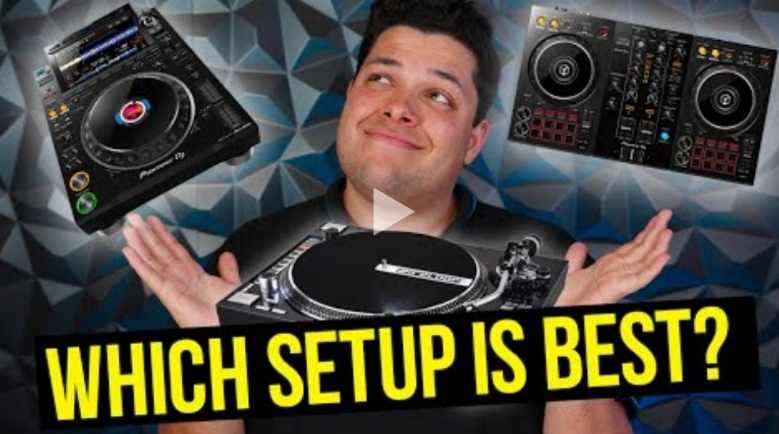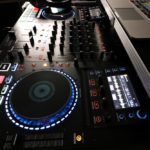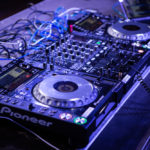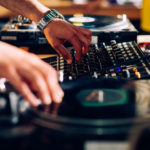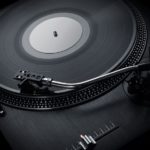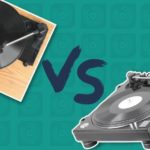CDJs vs Turntables has been an interesting debate over the years. If you’re confused between both options, consider their different features, and take into account the steeper learning curve required to master mixing on turntables. Also, take into account the price, sound quality, and portability before finalizing your decision.
Which Setup is Best?
Since the days when only turntables were used to embracing the digital transformation of DJing today, the number of options can be overwhelming for aspiring DJs.
Back in the day, it was simple! You only really had one option, a set of turntables and a mixer. Today, you have various options, from CDJs to DJ controllers to different DJ software types. But still, the trusty turntable stands the test of time and offers DJs the chance to mix authentically.
In this article, I will be comparing two heavyweights in DJ gear, CDJs and Turntables, to figure out which one suits your style more.
Let’s jump straight in!
Essential DJ Equipment
Whether your friend owns a setup or you go to a local club, two decks and a mixer is the most basic structure in most DJ setups.
The industry standard for many years was a set of Technics turntables along with a DJ mixer. As technology moved on, the once-proud standing turntables were relegated to a shelf or cupboard somewhere, replaced with a set of Pioneer CDJs.
CDJs vs Turntables – Which One Should You Choose?
If you have been researching, you must have read about the most debated DJing topic, which is CDJs vs turntables.
In the following sections, I will walk you through the basics of both setup options, along with the pros and cons.
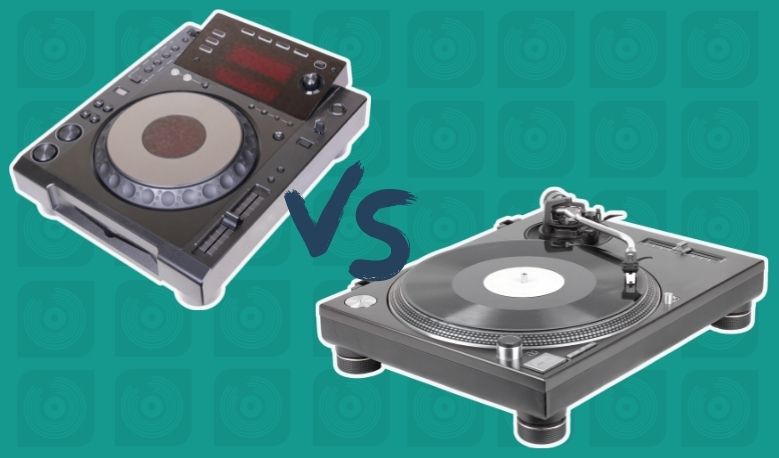
Are Turntables Best?
Are you even a DJ if you don’t have a turntable? You’ll hear this everywhere (at least I did when I was talking to like-minded people). “If you do not spin vinyl on a turntable, there’s no point of DJing.”
Well, all I can say is to each their own.
Yes, it is the most authentic form of DJing that requires a particular skill and understanding. However, that isn’t exclusive to just turntables.
Turntables were the only thing you could mix on in the 80s and 90s. You can call it the ‘Grandfather’ of all DJ setups. Two large rotating platters connected to a central mixer were the norm of dance parties and festivals worldwide.
Older turntables are analog, while newer versions have built-in preamps that convert analog to a phono output signal. But this does not matter, as, with every setup, you’ll require a DJ mixer.
When you connect turntables to a professional DJ mixer, they send the audio signals to an audio interface, studio monitors, or speakers.
Although it is challenging to use DJ turntables, you’ll find nothing else feels as good once you get the hang of it.
Have You Seen DVS?
It’s also important to note that you can still mix your digital music collection on turntables. That’s right. You can use a set of Technics 1210s without owner a single piece of vinyl!
DVS (Digital Vinyl System) and DJ software like Serato DJ and Traktor offer the ability to use unique pieces of vinyl that allow you to control digital files. This is so cool, as it will enable you to get the best of both worlds; authentic vinyl feels with modern performance functions.
Turntables Pros & Cons
Pros
- Unmatched Sound Quality – No matter what digital format you choose to play, vinyl has that warm sound quality and feels unmatched.
- Scratching – If your mixing style involves scratching, you should consider getting turntables over CDJs or DJ Controllers.
- Highly Durable – Turntables are built to last. I have seen turntable setups from the 80s that not only look as good as new but work perfectly fine as well.
Cons
- Expensive & High Maintenance – The tonearms and needles on turntables are very delicate and require extra care and handling. Unless you take proper care, they can get damaged easily. Furthermore, it is expensive to maintain as its components can be harder to come by.
- Heavy & Difficult to Transport – The average weight of a reasonable-sized, good-quality turntable is around 15 to 20lbs. It is not easy to transport if you wish to take your setup elsewhere to play.
- Not Very Versatile – Unless you go down the DVS route, turntables are not very versatile, limiting you to standard beatmatching and scratching.
Are CDJs Best?
The Technics SL1200 was the industry standard in DJ gear for many years. However, they were expensive and started to fall behind technologically as the music moved towards a digital era. Companies started designing and releasing DJ technologies that offer, more or less, a similar experience, but in a digital world.
If you are a regular at local clubs or weekend parties, you would have seen every DJ rocking either CDJs or a DJ controller. The CDJ has become one of the most common and popular pieces of DJ equipment in the past couple of decades.
The first CDJ made available to the public was in 1994. The Pioneer CDJ was called the CDJ-500, which took the industry by storm. The world of DJing moved from carrying heavy turntables and a bag of records to burning CDs and carrying a disc case.
The modern CDJ supports both standard CDs, flash drives, or even your laptop. It has become THAT easy.
CDJs offer convenience and are far less hassle for people. This is how they made their mark in the market. Thanks to recent technological advancements the CDJs have embraced, it is still considered an industry standard.
CDJ Pros & Cons
Pros
- Easy to Maintain – It is easier to maintain and get a CDJ fixed than a turntable. For instance, a Pioneer CDJ, if broken, has parts and other components readily available on the market. These are low maintenance.
- Industry Standard DJ Setup – The majority of the clubs have CDJs now. If you are booked for a gig, all you have to do is carry your USB stick with all the music you wish to play and your DJ headphones. . It has become as easy as plug-and-play.
- Easy to Use – Mixing music on turntables is more challenging when compared to other DJ setups. A CDJ offers cue buttons, a BPM reader, loops, FX, and much more. This makes it easier to use and gives you more options to play with.
Cons
- Expensive to Own – That’s right. Purchasing some top-end CDJs is costly than a pair of turntables. The ones you see in a club or big festivals are heavily priced and usually sold separately, not as pairs.
- Not as Organic as A Turntable – Mixing on CDJs does not give you those organic vibes. People who have been into mixing music since the 80s or 90s will always tell you vinyl and turntables are a better combination than digital CDJs.
- Lower Durability than Other DJ Equipment – Although CDJ decks may look sturdy, they are the least durable of all the DJ setups.
Differences Between A CDJ And A Vinyl Turntable
So, now that we have gone through each setup let’s briefly discuss the features and differences between both options.
Turntables
Performance features on most turntables are pretty limited. You get to start/stop and change the speed of records. That’s it!
Turntables main components are:
- Platter
- Speed Control
- Pitch Fader
- Tone Arm
- Start/Stop Button
- Power Switch
- Pop-Up Light
They also require additional components that need replacing over time, such as:
- Cartridges
- Stylus
- Slipmats
CDJs
Like turntables, CDJs have a pitch fader, start/stop buttons, and instead of platters, they have jog wheels. On top of this, modern CDsJ has numerous features that can take your performance to another level.
CDJs main performance features include:
- LED Display – To display track waveforms and other info
- Hot Cue
- Sync
- Looping
- Reversing
Both CDJ and turntable setups will require a DJ mixer. This is why all-in-one DJ controllers have become so popular, as they make redundant the need for a separate mixer.
Related Questions
Do you prefer CDJs, vinyl, or a DJ controller?
It depends on your preference and style. If you are not familiar with using vinyl, you will most likely find CDJs or controllers easier to begin with. Having said that, mixing with vinyl feels and sounds fantastic, and once you get the hand of it is so much fun!
Can you use a DJ controller in a club?
Technically, you can. But, it also depends on club policy and whether they allow you to bring your controller to DJ booths. As a beginner DJ, if you own a controller, know that it is similar to modern CDJs. The layout and functionality are the same. So, in case you are offered to play on a CDJ, do not miss the opportunity.
Why is mixing vinyl much more complicated than mixing using CDJ?
Mixing music on vinyl is complicated if you have not used turntables before. This is mainly because a turntable does not have a BPM reader and other helpful visual features the latest Pioneer CDJ has. You also have to be more gentle with vinyl, as they can jump and skip during a performance. Furthermore, you cannot be as creative with edits or effects unless you combine digital features.
Do you prefer CDJs, vinyl, or a DJ controller?
I prefer using a DVS with a turntable setup, but I am happy to use CDJs or a DJ controller. Don’t get too hung up on what format you are using. Go with whatever you feel more comfortable using.
Should a beginner DJ start with a DJ controller, a CDJ, or vinyl?
It’s better to opt for a DJ controller or a CDJ (if your budget allows) if you are a beginner DJ. Vinyl may be too tricky initially to get familiar with. Therefore, what I would recommend is to learn the art using more accessible and user-friendly models. Once you know how to mix music, you can experiment on turntables.
Final Words
Choosing the right DJ equipment is easier said than done. The CDJs vs turntable has been a hot topic ever since the Pioneer CDJ was introduced in the mid-90s.
For me, nothing quite feels as good as using a set of turntables spinning a vinyl record. However, being able to rock up at a venue with just a memory stick and headphones is just so convenient. I don’t miss dragging a record box around with me, that’s for sure!
As a beginner DJ, it’s never been easier and cheaper to get into DJing, with some excellent DJ gear available without breaking the bank.
Personally, if I were starting with DJing now, I’d skip both turntables and CDJs and opt for a DJ controller. For a couple of hundred bucks, you can get up and running and dip your toe into mixing. To get going with a turntable or CDJ setup, you’d have to spend well over $1000 unless you opt for a secondhand option.
Whatever DJ kit you decide to get, the most important thing is you have fun doing it. So don’t worry too much about what you are using, and stay happy spinning!
We hope you love the products we recommend. We may collect a commission if you purchase through one of our links. This doesn't cost you anything extra. If you do, thank you! As an Amazon Associate, I earn from qualifying purchases.

